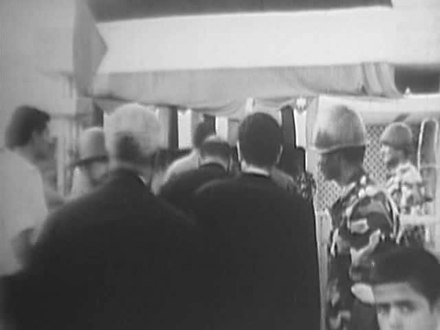Abu Nidal
Sabri Khalil al-Banna (May 1937 – 16 August 2002), known by his nom de guerre Abu Nidal, was the founder of Fatah: The Revolutionary Council, a militant Palestinian splinter group more commonly known as the Abu Nidal Organization (ANO).[1] At the height of its militancy in the 1970s and 1980s, the ANO was widely regarded as the most ruthless of the Palestinian groups.[2][3][4][5]
Abu Nidal ("father of struggle")[6] formed the ANO in October 1974 after a split from Yasser Arafat's Fatah faction within the Palestine Liberation Organization (PLO).[7] Acting as a freelance contractor, Abu Nidal is believed to have ordered attacks in 20 countries, killing over 300 and injuring over 650.[4][8][9] The group's operations included the Rome and Vienna airport attacks on 27 December 1985, when gunmen opened fire on passengers in simultaneous shootings at El Al ticket counters, killing 20. Patrick Seale, Abu Nidal's biographer, wrote of the shootings that their "random cruelty marked them as typical Abu Nidal operations".[10][11]
Abu Nidal died after a shooting in his Baghdad apartment in August 2002. Palestinian sources believed he was killed on the orders of Saddam Hussein, while Iraqi officials insisted he had committed suicide during an interrogation.[12][13] "He was the patriot turned psychopath", David Hirst wrote in the Guardian on the news of his death. "He served only himself, only the warped personal drives that pushed him into hideous crime. He was the ultimate mercenary."[14]
Sabri Khalil al-Banna was born in May 1937 in Jaffa, on the Mediterranean coast of what was then the British Mandate of Palestine. His father, Hajj Khalil al-Banna, owned 6,000 acres (24 km2) of orange groves situated between Jaffa and Majdal, today Ashkelon in Israel.[15] The family lived in luxury in a three-storey stone house near the beach, later used as an Israeli military court.[16] Muhammad Khalil al-Banna, Abu Nidal's brother, told Yossi Melman:
My father ... was the richest man in Palestine. He marketed about ten percent of all the citrus crops sent from Palestine to Europe - especially to England and Germany. He owned a summer house in Marseilles, France, and another house in İskenderun, then in Syria and afterwards Turkey, and a number of houses in Palestine itself. Most of the time we lived in Jaffa. Our house had about twenty rooms, and we children would go down to swim in the sea. We also had stables with Arabian horses, and one of our homes in Ashkelon even had a large swimming pool. I think we must have been the only family in Palestine with a private swimming pool.[17]
The kibbutz named Ramat Hakovesh has to this day a tract of land known as "the al-Banna orchard". ...My brothers and I still preserve the documents showing our ownership of the property, even though we know full well that we and our children have no chance of getting it back.



